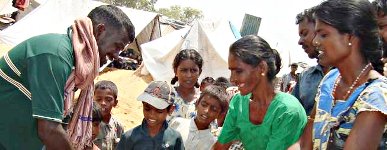FI calls for human beings to be at center of Climate Change discussions
As the international community prepares for the Paris Conference on Climate Change in December 2015, FI took the opportunity to remind decision-makers to keep human beings at the centre of the discussions.
As the international community prepares for the Paris Conference on Climate Change (COP21) in December 2015, FI took the opportunity to remind decision-makers to keep human beings at the centre of the discussions; and reiterated FI’s commitment to promote greater regulation for Business and Human Rights, that are very closely related to climate change issues.
FI’s Director Markus Heinze delivered the message at a side event to the Human Rights Council titled “Human Rights and Climate Change: Spiritual Negotiations towards Paris,” co-sponsored by FI, the Geneva Interfaith Forum on Climate Change, Environment and Human Rights (GIF) and other NGOs. It aimed at facilitating a discussion on climate change and human rights from an ethical and a spiritual perspective. In the context of the recent release of Pope Francis’ Encyclical on climate change, “Laudato Si”, the event enabled the four panellists to explore holistic approaches to climate change, all of them underlining the importance of integrating human rights in the climate change discussion and the principle of universal community with all living things.
Archbishop Silvano M. Tomasi, Permanent Observer for the Permanent Mission of the Holy See to the United Nations in Geneva, gave an overview of the encyclical - emphasising its continuity with both Catholic tradition and with science, and acknowledging the responsibility of human beings in climate change. The two following panellists highlighted the impact of climate change on people’s livelihoods: Nahida Sobhan from the Permanent Mission of Bangladesh underlined how climate change’s consequences limit capacity, and how equity, dignity, and fairness will be necessary ingredients to the Paris agreements. Isaiah Toroitich, Global Policy and Advocacy coordinator at the ACT Alliance, underlined how climate change has altered how he understands his work in international development and global relationships, advocating for language that brings community back into climate change negotiations. Finally, Yves Lador, Permanent Representative in Geneva for Earthjustice, challenged those present that given the present global framework that is based on post-World War II realities, the Paris agreement can only be a starting point, and the outcome should be framed as an evolving document, taking into consideration gender rights, participation, indigenous people, inter-generational equity, and just transition.
FI continues to seek justice for victims of climate change who are denied their most basic rights, by engaging human rights mechanisms at the UN and amplifying the concerns of those at the grassroots in international forums, and we are looking forward to participating in COP21 in Paris at the end of the year.




 Franciscans International
Franciscans International